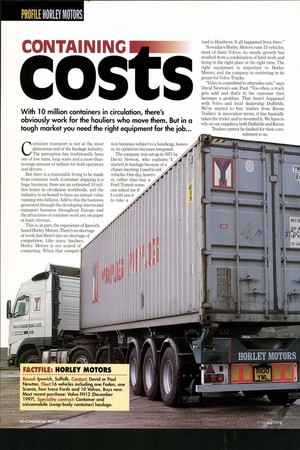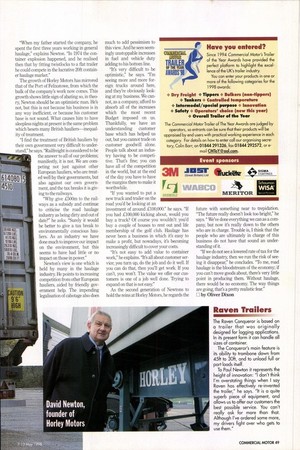cCONOTAINIsNG With 10 million containers in circulation, there's obviously work
Page 48

Page 49

If you've noticed an error in this article please click here to report it so we can fix it.
for the hauliers who move them. But in a tough market you need the right equipment for the job...
Container transport is not at the most glamorous end of the haulage industry The perception has traditionally been one of low rates, long waits and a more-thanaverage amount of tedium for both operators and drivers.
But there is a reasonable living to be made from container work. Container shipping is a huge business; there are an estimated 10 million boxes in circulation worldwide, and the industry is reckoned to have an annual value running into billions. Add to this the business generated through the developing intermodal transport business throughout Europe and the attractions of container work are, on paper at least, obvious. tion becomes subject to a handicap, however, its optimism becomes tempered. load to Heathrow. It all happened from there."
Nowadays-Horley Motors runs 15 vehicles, most of them Volvos: its steady growth has resulted from a combination of hard work and being in the right place at the right time. The right equipment is important to Horley Motors, and the company is unstinting in its praise for Volvo Trucks.
"Volvo is committed to aftersales care," says David Newton's son, Paul. "Too often, a truck gets sold and that's it; the customer then becomes a problem. That hasn't happened with Volvo and local dealership Duffields. We've started to buy trailers from Raven Trailers: in innovation terms, it has basically taken the trailer and re-invented it. We have to rely on our suppliers; both Duffields and Raven Trailers cannot be faulted for their commitment to us. "When my father started the company, he spent the first three years working in general haulage," explains Newton. "In 1974 the container explosion happened, and he realised then that by fitting twistlocks to a flat trailer he could compete in the lucrative 20ft container haulage market."
The growth of Horley Motors has mirrored that of the Port of Felixstowe, from which the bulk of the company's work now comes. This growth shows little sign of abating so, in theory, Newton should be an optimistic man. He's not, but this is not because his business is in any way inefficient, or because his customer base is not sound. What causes him to have sleepless nights at present is the same problem which besets many British hauliers-----inequality of treatment.
"I find the treatment of British hauliers by their own government very difficult to understand," he says. "Railfreight is considered to be the answer to all of our problems; manifestly, it is not. We are competing not just against other European hauliers, who are treated well by their governments, but also against our own government, and the tax breaks it is giving to the railways.
"Why give £500m to the railways as a subsidy and continue to criticise the road haulage industry as being dirty and out of date?" he asks. "Surely it would be better to give a tax break to environmentally conscious hauliers. As an industry we have done much to improve our impact on the environment, but this seems to have had little or no impact on those in power."
Newton's view is one which is held bymany in the haulage industry. He points to increasing competition from other European hauliers, aided by friendly government help. The impending legalisation of cabotage also does much to add pessimism to this view. And he sees seemingly unstoppable increases in fuel and vehicle duty adding to his bottom line.
"It's very difficult to be optimistic," he says. "I'm seeing more and more foreign trucks around here, and they're obviously looking at my business. We cannot, as a company, afford to absorb all of the increases which the most recent Budget imposed on us. Thankfully, we have an understanding customer base which has helped us out, but you cannot trade on customer goodwill alone. People talk about an industry having to be competitive. That's fine; you can have all of the competition in the world, but at the end of the day you have to have the margins there to make it worthwhile.
"If you wanted to put a new truck and trailer on the road you'd be looking at an investment of around L100,000." he says. "If you had £100,000 kicking about, would you buy a truck? Of course you wouldn't: you'd buy a couple of houses to rent out and life membership of the golf club. Haulage has never been a business in which it's easy to make a profit, but nowadays, it's becoming increasingly difficult to cover your costs.
"It's not easy to add value to container work," he explains. "It's all about customer service; you turn up, do the job and do it well. If you can do that, then you'll get work. If you can't, you won't The value we offer our customers is one of a job well done. Trying to expand on that is not easy."
As the second generation of Newtons to hold the reins at Horley Motors, he regards the future with something near to trepidation. "The future really doesn't look too bright," he says. "We've done everything we can as a company, but now it's really down to the others who are in charge. Trouble is, I think that the people who are ultimately in charge of this business do not have that sound an understanding of it.
"If we do not see a lowered rate of tax for the haulage industry, then we run the risk of seeing it disappear," he concludes. "To me, road haulage is the bloodstream of the economy; if you can't move goods about, there's very little point in producing them. Without haulage, there would be no economy. The way things are going, that's a pretty realistic fear."
by Oliver Dixon Raven Trailers The Raven Conqueror is based on a trailer that was originally designed for logging applications. In its present form it can handle all sizes of container.
The Conqueror's main feature is its ability to trombone down from 45ft to 30ft, and to unload full or part loads itself. To Paul Newton it represents the height of innovation: "I don't think I'm overstating things when I say Raven has effectively re-invented the trailer," he says. "It is a quite superb piece of equipment, and allows us to offer our customers the best possible service. You can't really ask for more than that. Although I've ordered some more, my drivers fight over who gets to use them."
























































































































